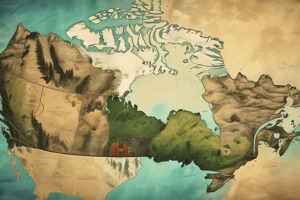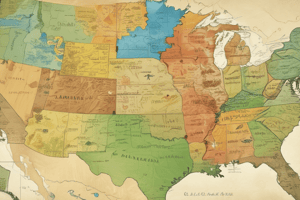Podcast
Questions and Answers
What is the primary reason Canada is considered the largest source of freshwater in the world?
What is the primary reason Canada is considered the largest source of freshwater in the world?
- It has the longest coastline in the world.
- It has the most number of lakes compared to other countries.
- It has a high population living in urban areas.
- It represents 20% of the world’s fresh water. (correct)
Which of the following islands is NOT listed as one of the top ten biggest islands in the world?
Which of the following islands is NOT listed as one of the top ten biggest islands in the world?
- Ellesmere Island
- Prince Edward Island (correct)
- Victoria Island
- Baffin Island
What is the estimated population density of Canada?
What is the estimated population density of Canada?
- 10 people per square kilometer
- 3.9 people per square kilometer (correct)
- 15 people per square kilometer
- 1.5 people per square kilometer
What is unique about Little Manitou Lake in Saskatchewan?
What is unique about Little Manitou Lake in Saskatchewan?
Which city serves as the capital of Canada?
Which city serves as the capital of Canada?
What is the average high temperature in Canada during the summer?
What is the average high temperature in Canada during the summer?
How long would it take a person to walk along Canada’s shorelines at a pace of 20 km a day?
How long would it take a person to walk along Canada’s shorelines at a pace of 20 km a day?
Which province is the largest in Canada by land area?
Which province is the largest in Canada by land area?
Flashcards
Canada: Size
Canada: Size
Canada is the second biggest country globally, encompassing a vast expanse of land.
Canada: Coastline
Canada: Coastline
Canada is the country with the longest coastline globally, stretching for over 243,000 km.
Canada: Origin of Name
Canada: Origin of Name
The word "Canada" originates from the Huron Iroquois language, meaning "village" or "settlement."
Canada: Capital City
Canada: Capital City
Signup and view all the flashcards
Canada: Lakes
Canada: Lakes
Signup and view all the flashcards
Canada: Uranium Production
Canada: Uranium Production
Signup and view all the flashcards
Canada: Climate Zones
Canada: Climate Zones
Signup and view all the flashcards
Canada: Population Density
Canada: Population Density
Signup and view all the flashcards
Study Notes
Canada - Geography and Demographics
- Largest country in the Western Hemisphere, second largest globally
- Borders only the United States
- Longest coastline globally, approximately 243,000 km
- Origin of the name "Canada" from the Huron Iroquois word "kanata" meaning "village" or "settlement"
Canada - Cities and Islands
- Ottawa, the capital, is the second-largest city in Ontario (population 1.5 million)
- Three Canadian islands are among the world's top ten largest islands: Baffin, Victoria, and Ellesmere
- Canada has 2 million lakes, 563 larger than 100 square kilometers, making it the world's largest source of freshwater (20% of global freshwater)
- Notable lakes include Lake Huron, Great Bear Lake, and Lake Superior.
- Canada holds some of the oldest rocks on Earth, including a 4.28 billion-year-old rock discovered in northern Quebec.
- Little Manitou Lake in Saskatchewan is a saline lake, similar to the Dead Sea, with extremely high mineral salt content of 180,000 milligrams per liter, making it highly buoyant.
Canada - Population and Urbanization
- 82% of Canadians live in urban areas
- Major cities with populations over 1 million include Toronto, Montreal, Vancouver, Calgary, Edmonton, and Ottawa
- Canada has one of the lowest population densities in the world (estimated at 3.9 people per square kilometer)
- Quebec is the largest province by land area (1.5 million square kilometers)
Canada - Economy and Resources
- Leading uranium producer, used in nuclear power plants
- Major energy supplier to the USA (oil and gas)
Canada - Climate
- Four climate zones: marine, cold, very cold, and sub-arctic/arctic
- Average summer high temperature: 35°C
- Average winter low temperature: -25°C
- Variations in daylight hours across the country (south receives 8 hours of daylight in December, while northern regions have none.)
- Summers can involve humidity, warm temperatures, and storms. Winters are significantly colder, with ice and snow
Canada - Holidays
- Celebrates Canada Day on July 1st
Studying That Suits You
Use AI to generate personalized quizzes and flashcards to suit your learning preferences.




